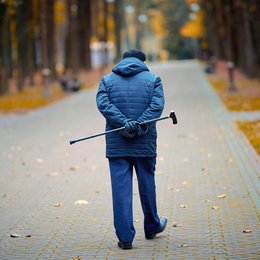
It Gets Easier
How to cope with loneliness after the loss of a loved one.
Spending time by oneself can be healthy, but not when it causes loneliness and despair. Chronic loneliness, or the persistent feeling of being alone, is often caused by the loss of a significant other, a family member, or a close friend. Such losses tend to mount we as age, presenting challenges that can be difficult for some of us to overcome.
More than one-third of adults ages 45 and older feel lonely, and nearly one-fourth of adults ages 65 and older consider themselves to be socially isolated, according to a report from the National Academies of Sciences, Engineering, and Medicine. In other words, older adults face an increased risk of loneliness and social isolation, either because they live alone, struggle with chronic illness, or suffer from a lost or severely diminished social network.
Social isolation can be quite problematic, given the other difficulties it can lead to—namely, an increased risk of dementia, higher rates of depression and anxiety, increased rates of substance use and abuse, and premature death caused by heart disease and stroke. Some even resort to suicide.
“We see a lot of seniors who deal with these kinds of problems, particularly around the holidays,” says Chris Pagnani, M.D., the founder and medical director of Rittenhouse Psychiatric Associates, which has offices in Philadelphia and Paoli, and an instructor at The Johns Hopkins Hospital School of Medicine in Baltimore. “It’s not uncommon to feel lonely if you have a family member, close friend, or significant other who passes, and those feelings of loneliness often intensify at this time of year.”
He believes not enough attention gets paid to the topic. Although no one likes to think about the loss of those closest to us and the emotional turmoil that can result, it’s a natural, however unfortunate, reality of life.
Symptoms of chronic loneliness may include significant fluctuations in one’s sleep patterns, appetite, or weight, as well as changes in energy, libido, or the ability to concentrate. Other telling signs that someone may be struggling may include out-of-proportion responses to problems that arise.
Maintaining—or perhaps reestablishing—strong social connections are essential to combating persistent feelings of loneliness and despair, according to Dr. Pagnani. He also suggests that returning to a healthier emotional space will take some work—a combination of attention and intention.
“Even if it’s the last thing people want to do, maintaining a healthy social community and connection to the outside world is incredibly important,” he adds. “You also have to be able to reflect on how you’re doing, give yourself some compassion, and realize what you’re going through is difficult. … Even though it may not feel like it, things get easier over time.”
As the winter holidays near, he offers the following advice to anyone who feels alone in the world, regardless of their age: Show yourself some grace, and don’t be afraid to share how you’re feeling.
“Sometimes a common response from people who are struggling is to feel embarrassed about not looking forward to the holidays, because it’s supposed to be a joyful time of year,” he says. “It’s completely normal to feel the way you’re feeling. Other people are likely to be more accepting of what you’re going through than you realize.”
Published (and copyrighted) in Suburban Life, November 2023.


